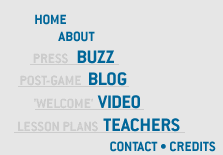LESSON TEN:
Your World Without Oil
Introduction
Communication is a vital skill for life in general, but it is even more critical in a crisis. Inside the World Without Oil game, people are using text, voice, images and video to communicate the realities of the oil crisis, to pool information about complex problems and collaborate on solutions. Outside the game, these new media communications are a meaningful (and engaging) way for people to express their ideas and insights about a possible future and the consequences of choices we make in the present.
In this final lesson, students get the chance to create their own "in-game" citizen report, springboarding from the WWO material they have found most memorable in earlier lessons.
Lesson Objectives
Students will:
-
Continue to immerse themselves in the realistic WWO scenario.
-
Listen to and analyze an "in-game" event report.
-
Develop a message goal, and conceptualize, script and deliver their own citizen narrative to achieve that goal.
- Express their personal strategies predicated upon anticipated events.
- Continue to reflect on the life changes that would occur in a prolonged oil shortage.
Before the Lesson
Part 1: Set the Stage
Student Page for this lesson is here:
http://worldwithoutoil.org/metalesson10s.htm
This page summarizes ideas and instructions for students.
- Re-immerse the students: briefly remind them of what's happened previously in a World Without Oil.
- Brief students about an audio clip they are about to hear. Each student group will soon be asked to script and deliver a similar audio clip. The goal is to communicate their own impressions of their life from inside a World Without Oil.
- Play Anna_Matter's Week 21 podcast: http://dessum9.hipcast.com/deluge/70ceba90-df01-ab77-623e-2c5f9fbf5e66.mp3
Part 2: Take Action
-
Discuss with the students some of the choices and techniques used by Anna. Notice for example how she interweaves her own stories with those of the WWO players and events she is reporting on. Are you able to visualize the building she lives in and the other people who live there?
- Have students separate into their groups, then give each group an assignment: quickly script a short broadcast narrative like Anna's that includes a summary mention of at least 5 WWO stories that students remember from prior lessons. (The videos by Kalwithoutoil would be examples.) The summary mention should communicate in a sentence or two what happens (and what students learned) in each story.
- The student script should also include personal story, as Anna's did, that communicates their own perspective on their life within a World Without Oil.
- The group is striving to create a report that conveys what the oil crisis is like - and makes the crisis real.
- Remind the students that they are inside the oil crisis. They thus have a hard deadline to come up with their narrative and prepare to deliver it. The narrative should not be more than 3 minutes long.
Part 3: Lesson Activity
- At the deadline, stop work. Bring the class back together and focus the students on listening to the narratives.
-
Have a representative or representatives from each group deliver its narrative.
- When finished, discuss the effectiveness of the narratives in achieving these goals:
- Communicating the essence of the 5 WWO stories.
- Communicating the essence of the student's life within the oil crisis.
- Conveying what the oil crisis is like.
- Making the oil crisis seem real.
Part 4: Reflect
Have students reflect on the elements that go into a citizen report and the role of each element in achieving the report's goals. Does a citizen report differ from a newscaster's? What makes a citizen report more believable and trustworthy? What makes it more memorable and communicative?
Part 5: Take It Further
Students can draft and record longer podcasts, or even script and shoot videos that are entirely "inside" the alternate reality of World Without OIl.
Additional Resources
National Standards (McREL)
Overarching (All Lessons)
Standard 44.
Understands the search for community, stability, and peace in an interdependent world
Level IV (Grades 9-12), Benchmark 2:
Understands rates of economic development and the emergence of different economic systems around the globe (e.g., systems of economic management in communist and capitalist countries, as well as the global impact of multinational corporations; the impact of black markets, speculation, and trade in illegal products on national and global markets; patterns of inward, outward, and internal migration in the Middle East and North Africa, types of jobs involved, and the impact of the patterns upon national economies; the rapid economic development of East Asian countries in the late 20th century, and the relatively slow development of Sub-Saharan African countries)
Lesson 10: Specific Standards
Economics
Standard 6: Understands the roles government plays in the United States economy
Level IV, Benchmark 7: Understands that few incentives exist for political leaders to implement policies that entail immediate costs and deferred benefits, even though these types of programs may be more economically effective
Civics
Standard 28: Understands how participation in civic and political life can help citizens attain individual and public goals
Level IV, Benchmark 3: Knows the many ways citizens can participate in the political process at local, state, and national levels, and understands the usefulness of other forms of political participation in influencing public policy (e.g., attending political and governmental meetings, demonstrating, contacting public officials, writing letters, boycotting, community organizing, petitioning, picketing)
Geography
Standard 5: Understands strategies used in natural resource management and conservation
Level IV, Benchmark 5: Knows traditional energy sources (e.g., petroleum, coal, wood) as well as alternative energy sources (e.g., wind, solar, geothermal, hydropower, biofuels)
State Standards (All Lessons)
![]()
![]()
![]()
![]()
![]()
![]()
![]()
![]()
![]()
![]()
![]()






